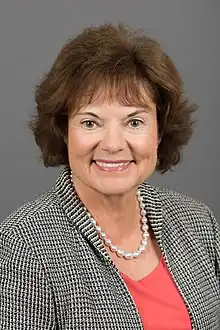Denisa Wagner
Denisa D. Wagner is an American scientist currently the Edwin Cohn Professor of Pediatrics at Boston Children's Hospital (BCH), Harvard Medical School.[1][2][3] Wagner first arrived in the United States in 1975 as a refugee from Czechoslovakia.[4] She received her PhD in Biology from the Massachusetts Institute of Technology and taught at the University of Rochester and Tufts University before joining the Harvard faculty in 1994.[3]The Wagner Lab contributes in the fields of vascular biology, inflammation, and thrombosis. Her Lab focuses on how blood cells and endothelial cells respond to vascular injury.[1] Also her lab has been studying NETs (Neutrophil Extracellular Traps) for more than a decade.[5] In 2015, research from the lab shed light on healing wounds in patients with diabetes.[6] In the same year she received the Robert P. Grant Medal, which is the highest award of the International Society on Thrombosis and Hemostasis (ISTH).
Denisa Wagner | |
|---|---|
 | |
| Born | Prague, Czechoslovakia |
| Alma mater | |
| Awards |
|
| Scientific career | |
| Thesis | (1980) |
| Doctoral advisor | Richard O. Hynes |
Wagner is an Elected Fellow of the American Association for the Advancement of Science.[7] In 2017 the American Heart Association honored her as one of the year's Distinguished Scientists[8] and in 2021, she delivered the Russell Ross Memorial Lectureship in Vascular Biology.[9] In 2021, Wagner received the prestigious Henry B. Stratton Medal in Basic Science from the American Society of Hematology.[10] Dr. Wagner is widely published,[11] with more than 50,000 citations[12] and an h-index of 129.
References
- "Denisa Wagner". Harvard.edu. Retrieved May 13, 2017.
- "Lab". Harvard.edu. Retrieved May 13, 2017.
- "Denisa Wagner". Childrenshospital.org. Retrieved May 13, 2017.
- Ince, Susan (2018-10-12). "Denisa Wagner". Circulation Research. 123 (9): 1020–1023. doi:10.1161/CIRCRESAHA.118.314091. PMID 30355160.
- Nancy Fliesler (3 August 2020). "Lung Link". harvard.edu.
- "New findings could stop slow wound healing in people with diabetes". Diabetes.co.uk. Retrieved 2019-01-21.
- "AAAS Members Elected as Fellows". American Association for the Advancement of Science. Retrieved 2019-01-21.
- "Seven Distinguished Scientists to be honored during Sunday afternoon Opening Session". AHA Scientific Sessions Daily News. 2017-11-12. Retrieved 2019-01-21.
- "2021 Russell Ross Memorial Lectureship in Vascular Biology Lecturer – Denisa D. Wagner, PhD, FAHA". professional.heart.org. Retrieved 2022-04-05.
- "2021 Henry M Stratton Medal Recipients: Denisa Wagner, MD and Kwaku Ohene-Frempong, MD - Hematology.org". www.hematology.org. Retrieved 2022-04-05.
- "My Bibliography - NCBI". www.ncbi.nlm.nih.gov. Retrieved 2022-04-05.
- "Denisa D. Wagner". scholar.google.com. Retrieved 2022-04-05.
Further reading
- Wagner, Denisa D.; Heger, Lukas A. (2022-09-01). "Thromboinflammation: From Atherosclerosis to COVID-19". Arteriosclerosis, Thrombosis, and Vascular Biology. 42 (9): 1103–1112. doi:10.1161/ATVBAHA.122.317162. PMC 9420806. PMID 35861953.
- "Body's response to injury and inflammation may hinder wound healing in diabetes". EurekAlert.org. Retrieved 18 March 2019.
- "Fighting age-related fibrosis to keep organs young: Fibrosis happens little by little, each time we experience illness or injury; eventually, this causes our health to decline". ScienceDaily.com. Retrieved 18 March 2019.
- Brill, A.; Fuchs, T.A.; Savchenko, A.S.; Thomas, G.M.; Martinod, K.; De Meyer, S.F.; Bhandari, A.A.; Wagner, D.D. (1 January 2012). "Neutrophil extracellular traps promote deep vein thrombosis in mice". Journal of Thrombosis and Haemostasis. 10 (1): 136–144. doi:10.1111/j.1538-7836.2011.04544.x. PMC 3319651. PMID 22044575.
- Fuchs, Tobias A.; Brill, Alexander; Duerschmied, Daniel; Schatzberg, Daphne; Monestier, Marc; Myers, Daniel D.; Wrobleski, Shirley K.; Wakefield, Thomas W.; Hartwig, John H.; Wagner, Denisa D. (7 September 2010). "Extracellular DNA traps promote thrombosis". Proceedings of the National Academy of Sciences of the United States of America. 107 (36): 15880–15885. Bibcode:2010PNAS..10715880F. doi:10.1073/pnas.1005743107. PMC 2936604. PMID 20798043.